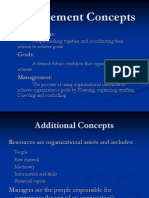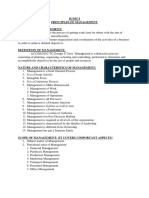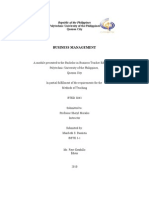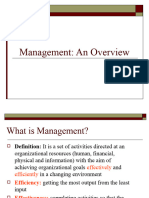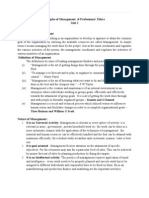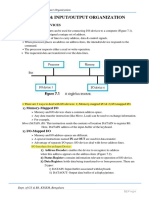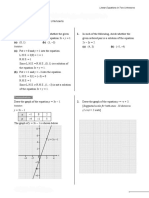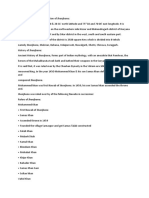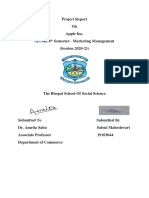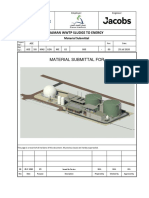1A)
NATURE OF MANAGEMENT
It is a Universal Activity: Management is relevant in every sphere of activity. It is relevant in army,
government, private household work etc. the work can be done in a more systematic manner with
the application of the techniques of management. The material and human resources can be
effectively handled and the goal can be attained with maximum efficiently.
It is goal oriented: Management focuses attention on the attainment of specific objectives. For Ex. a
business may aim for a particular level of sales. This can be achieved by proper forecast of sales by
planning production by fixing the targets.
It is an Intellectual activity: the practice of management requires application of mind and
intelligence. Every work needs to be properly planned and Execute work has to be assigned to
different Individuals and responsible have to be fixed on them. Ex. in a manufacturing unit
production finance and marketing are the important activities performed. It has to work in proper
co-ordination with the other departments. Then only objectives of the firm can be achieved.
It is a process: it is process consisting of various stages/ functions. Planning is the starting point of
management and control is its last stage.
It is intangible: it is invisible cannot be seen. But it can be felt.
1B) Importance of Management:
Achievement of Group Goals: Management enables an enterprise to achieve its desired objectives
through proper planning and control. It decides what should be done and how. It lays down the long
term and short term goals keeping in mind the resources of the enterprise.
Optimum utilization of resources: Materials, machines and money are the physical factors of
production. The efficient use of these resources depends upon the efficiency and motivation of
workers. Management makes the workers efficient and motivate through training, supervision and
inspiring leadership. Managers guide and motivate workers towards best performance
Fulfillment of social obligations: Sound management monitors the environment of business and
makes necessary changes in business policies and practices. So as to keep the customers and workers
satisfied.
Stability of Management it ensures the survival of an organization in a fast changing environment. It
coordinates the activities of different departments in an organization and monitors team spirit
amongst the personnel.
Human development Management improves the personality and caliber of people to raise their
efficiency and productivity. A good manager serves as a friend and guide to his subordinates. He
provides vision and confidence.
1C) Top Level Management: the top level management derives its powers and authority directly
from the owners of the enterprise. They are Board of Directors, Chairman, Managing Directors, COO,
CEO etc.
• Set the fundamental objectives and overall vision of the enterprise.
�• Frame major policies and strategies to achieve long-term goals.
• Appoint key managerial personnel for middle-level positions.
• Prepare master plans for finance, human resource, technology, production, and marketing.
• Take major decisions like mergers, expansion, or diversification.
Middle Level Management: they are departmental managers (Head of Department) like
Production managers, Marketing managers, Personnel managers, Finance manager,
Regional manager and other managers.
▪ They play the role of a linking pin between top level management and the lower level
management.
▪ They explain the objectives, strategies, policies laid down by the top level management to the
low level management.
▪ Communicates the problems, suggestions and view points of the lower management to the
top management.
▪ They prepare the departmental plans.
▪ They submit reports on the performance at various departments to the top management.
Lower Level of Management: It is called as operating level management or supervisory
level. This is the level where actual operational work for the enterprise in the areas of
production, finance, marketing, personnel, etc is performed by workers. This level of
management consists of manger like supervisors, the foreman, the sales officers, the
accountants, the sectional officers etc
• Focus on day-to-day operational work in production, finance, sales, and personnel.
• Give instructions and guidance to workers to ensure best performance.
• Supervise workers closely and make sure work meets quality and time standards.
• Handle worker issues, maintain discipline, and motivate staff.
• Submit performance reports of workers to the middle level
4a) MBO is a management approach where managers and employees set goals together, and
performance is evaluated based on how well these goals are achieved. It was introduced by Peter
Drucker. The main idea is that if employees take part in setting objectives, they work with more
commitment and clarity.
Steps in MBO:
• Setting organizational goals.
• Dividing them into departmental and individual objectives.
• Preparing action plans.
• Monitoring progress.
• Evaluating performance and giving feedback
Advantages:
• Better communication and coordination.
• Increases employee motivation.
• Focuses on results, not just activities.
• Provides a clear basis for performance appraisal.
Limitations:
• Time-consuming.
• Success depends on employee cooperation.
� • Difficult in uncertain environments
Example: Suppose a company wants to increase its sales. The sales manager and a salesperson
mutually decide on a goal: “Increase monthly sales by 15% within the next 3 months.” The
salesperson works towards achieving this goal, while the manager provides support like training,
better marketing strategies, or incentives. At the end of 3 months, performance is reviewed to check
if the target was met.
Thus, MBO ensures clarity of goals, motivates employees, improves coordination, and helps in
measuring performance in an objective way.
4b) Barriers to Effective Planning
Various barriers can stop planning from being successful. For plans to give the desired results,
managers must identify these barriers and try to overcome them. The common barriers are:
Inability to plan or inadequate planning:
Managers are not born with the ability to plan. Some lack the right background, training, or skills,
while others may have never learned how to plan properly. So, even if they try to plan, they may not
know how to follow the correct process.
Lack of commitment to the planning process:
Making a plan takes time and effort. Many managers find it easier to say they are too busy rather
than spend time on planning. Some may also fear failure, so they avoid planning seriously. As a
result, they may do very little or ignore the planning process.
Inferior information:
If the information used in planning is outdated, poor in quality, or insufficient, the plans are likely to
fail. No matter how well a plan is prepared, it cannot succeed if it is based on weak information.
Focusing on the present at the expense of the future:
Sometimes managers give more importance to short-term issues and ignore long-term effects. This
can create problems in the future. While planning, managers should always keep the bigger picture
and long-term goals in mind.
Too much reliance on the organization’s planning department:
Many organizations have planning departments that do research, studies, and forecasts. These are
useful for support, but they cannot replace the manager’s responsibility. Making and owning the
plan should still be the manager’s duty.
























